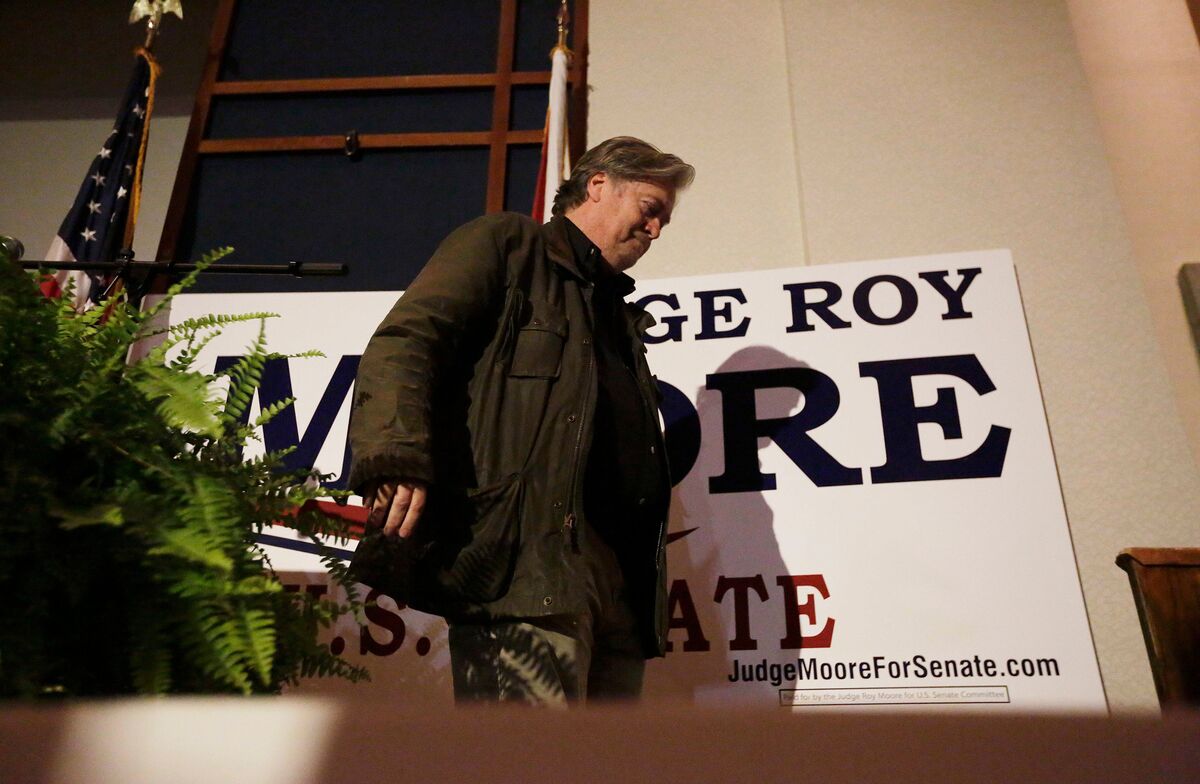
12 special Senate election in Alabama is being touted as the next clash in the ongoing battle between Steve Bannon and Senate Majority Leader Mitch McConnell for the soul of the Republican Party—what Bannon, with characteristic hyperbole, calls a “season of war.” Roy Moore, the GOP candidate, stands accused of numerous incidents of sexual misconduct, including allegations that he molested a 14-year-old girl. That’s prompted McConnell, a Kentucky Republican, and most of his GOP colleagues to disavow him. Bannon, by contrast, was Moore’s most important ally in the wake of the sex scandal, at least until President Donald Trump took to Twitter to weigh in on Moore’s behalf.
McConnell knows that having an accused child molester in the Senate would be toxic for his party’s image, and that Moore’s stubborn recklessness would make his own job next to impossible. For Bannon, one suspects, this is the whole source of Moore’s appeal.
Bannon’s stated rationale for backing Moore is that he’ll help carry out the populist revolt that the former White House chief strategist is attempting to lead against McConnell and the GOP establishment. It’s an odd claim to make, since Moore is less of a “populist” than a “theocrat.” He was twice kicked off the Alabama Supreme Court, once for refusing to remove a Ten Commandments monument, the other time for refusing to grant marriage licenses to gay couples. What’s more, Bannon has a more powerful weapon to deploy that really does align with his professed politics and would all but ruin McConnell: He could oppose the Republican tax plan.
Bannon rose to prominence by espousing a brand of Republican politics that differed sharply from what party leaders such as McConnell and House Speaker Paul Ryan were pushing. Instead of tax cuts for the wealthy and slashed entitlement spending, Bannon thought the GOP should become a “workers’ party” focused on strengthening the middle class. This idea was so popular with conservative voters that when Trump took it up, he won the Republican presidential nomination. It also helped him steal blue-collar voters from Hillary Clinton in the general election.
Since his inauguration, however, Trump has consistently deferred to the same Republican leaders whose priorities he exposed as being out of step with the rest of the country. Nothing illustrates this better than the tax plan McConnell and his allies are frantically trying to rush through the Senate.
By almost every analysis, the benefits of the Republican tax plan skew heavily toward corporations and the rich. According to the Tax Policy Center, the top 1 percent of American earners would receive 62 percent of the Senate bill’s tax reductions by 2027. Two-thirds of middle-income Americans—that is, the “workers” who’d be the rank-and-file members of Bannon’s “Workers’ Party”—would get a tax hike.
An analysis by the Tax Foundation concluded that 75 percent of the House bill’s corporate tax cuts would accrue to business owners, while just 25 percent would wind up with workers.
Along similar lines, the Congressional Budget Office found that the biggest beneficiaries of the Senate plan would be millionaires and those earning from $100,000 to $500,000 a year. And despite Trump’s promise not to cut entitlement spending, the CBO analysis also said that the $1.5 trillion the tax plan adds to the deficit would trigger $25 billion in automatic spending cuts from Medicare.
The Republican tax plan would also eliminate (House version) or sharply reduce (Senate version) the estate tax, which applies only to multimillionaires; eliminate the Alternative Minimum Tax on high earners; maintain the controversial carried-interest tax that benefits private equity executives; and even eliminate a tax on private jet travel. What’s more, the tax cuts for corporations would be permanent, while those aimed at workers would be only temporary.
In sum, the GOP tax plan makes a mockery of what Bannon and his followers claim to stand for by directing its major benefits to the kind of plutocrats who donate to McConnell and his Republican colleagues—one reason the plan is deeply unpopular with most voters. A recent ABC News poll found that 60 percent of Americans think the plan favors the wealthy, and just one in three support it.
So far, Bannon’s populist revolt has met with only middling success. Although he’s pledged to run insurgents in 2018 against every GOP incumbent but Ted Cruz, a strong slate of candidates has yet to emerge. One place Bannon has succeeded, though, is in tarnishing McConnell’s image among Republicans. Polls consistently show the majority leader to be the least popular member of the Senate, and an Oct. 24 Harvard-Harris poll found that most Republicans wish he would resign. If McConnell can’t pass a tax bill, he may have to.
Given this vulnerability, Bannon could use his influence and platform at Breitbart News to highlight the plutocratic skew of the GOP plan and demand that its spoils be redirected to the ordinary workers who elected Trump. Calling on Republicans to swap out the estate tax repeal, carried interest breaks and cuts for millionaires for, say, a payroll tax cut aimed squarely at the middle class would put McConnell in an impossible bind, while providing Bannon the dual benefits of being broadly popular and entirely consistent with his and Trump’s 2016 campaign message.
Instead, Bannon has been raging at McConnell without doing much to inhibit his agenda. He may yet carry Moore to victory. But if McConnell’s tax plan becomes law, there’ll be little doubt as to who is the true victor.


0 comments:
Post a Comment